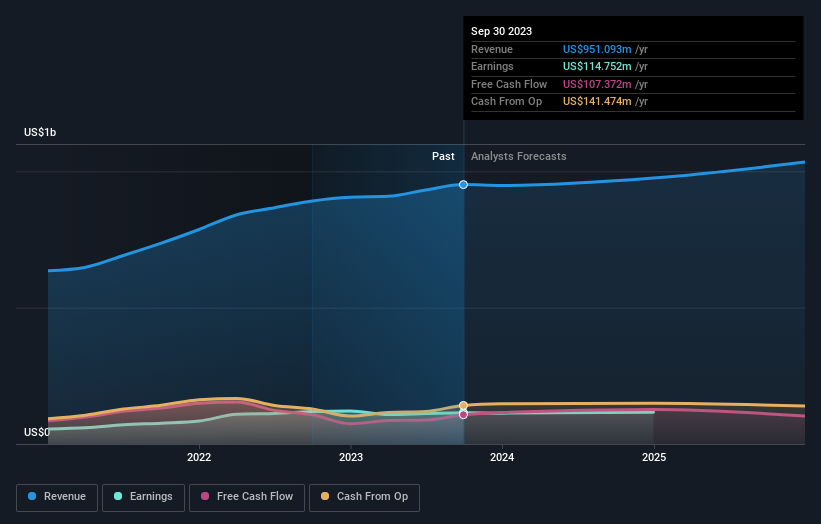
Kadant Inc. (NYSE:KAI), is not the largest company out there, but it received a lot of attention from a substantial price increase on the NYSE over the last few months. As a mid-cap stock with high coverage by analysts, you could assume any recent changes in the company’s outlook is already priced into the stock. However, could the stock still be trading at a relatively cheap price? Let’s take a look at Kadant’s outlook and value based on the most recent financial data to see if the opportunity still exists.
View our latest analysis for Kadant
Is Kadant Still Cheap?
Kadant appears to be expensive according to my price multiple model, which makes a comparison between the company's price-to-earnings ratio and the industry average. In this instance, I’ve used the price-to-earnings (PE) ratio given that there is not enough information to reliably forecast the stock’s cash flows. I find that Kadant’s ratio of 27.71x is above its peer average of 21.03x, which suggests the stock is trading at a higher price compared to the Machinery industry. If you like the stock, you may want to keep an eye out for a potential price decline in the future. Since Kadant’s share price is quite volatile, this could mean it can sink lower (or rise even further) in the future, giving us another chance to invest. This is based on its high beta, which is a good indicator for how much the stock moves relative to the rest of the market.
Can we expect growth from Kadant?

Investors looking for growth in their portfolio may want to consider the prospects of a company before buying its shares. Buying a great company with a robust outlook at a cheap price is always a good investment, so let’s also take a look at the company's future expectations. Though in the case of Kadant, it is expected to deliver a relatively unexciting earnings growth of 1.0%, which doesn’t help build up its investment thesis. Growth doesn’t appear to be a main reason for a buy decision for Kadant, at least in the near term.
What This Means For You
Are you a shareholder? KAI’s future growth appears to have been factored into the current share price, with shares trading above industry price multiples. However, this brings up another question – is now the right time to sell? If you believe KAI should trade below its current price, selling high and buying it back up again when its price falls towards the industry PE ratio can be profitable. But before you make this decision, take a look at whether its fundamentals have changed.
Are you a potential investor? If you’ve been keeping tabs on KAI for some time, now may not be the best time to enter into the stock. The price has surpassed its industry peers, which means it is likely that there is no more upside from mispricing. However, the positive growth outlook may mean it’s worth diving deeper into other factors in order to take advantage of the next price drop.
If you'd like to know more about Kadant as a business, it's important to be aware of any risks it's facing. While conducting our analysis, we found that Kadant has 1 warning sign and it would be unwise to ignore this.
If you are no longer interested in Kadant, you can use our free platform to see our list of over 50 other stocks with a high growth potential.
If you're looking to trade Kadant, open an account with the lowest-cost platform trusted by professionals, Interactive Brokers.
With clients in over 200 countries and territories, and access to 160 markets, IBKR lets you trade stocks, options, futures, forex, bonds and funds from a single integrated account.
Enjoy no hidden fees, no account minimums, and FX conversion rates as low as 0.03%, far better than what most brokers offer.
Sponsored ContentValuation is complex, but we're here to simplify it.
Discover if Kadant might be undervalued or overvalued with our detailed analysis, featuring fair value estimates, potential risks, dividends, insider trades, and its financial condition.
Access Free AnalysisHave feedback on this article? Concerned about the content? Get in touch with us directly. Alternatively, email editorial-team (at) simplywallst.com.
This article by Simply Wall St is general in nature. We provide commentary based on historical data and analyst forecasts only using an unbiased methodology and our articles are not intended to be financial advice. It does not constitute a recommendation to buy or sell any stock, and does not take account of your objectives, or your financial situation. We aim to bring you long-term focused analysis driven by fundamental data. Note that our analysis may not factor in the latest price-sensitive company announcements or qualitative material. Simply Wall St has no position in any stocks mentioned.
About NYSE:KAI
Flawless balance sheet with questionable track record.
Similar Companies
Market Insights
Community Narratives



